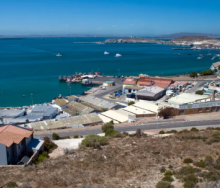Tanzania’s fast-growing cashew trade now has a dedicated ocean freight service for exporting nuts from the Port of Mtwara to markets in India, Vietnam and China.
From the end of October until February next year, the Maersk-introduced ‘Korosho Express’ will run bi-weekly services from the port in southern Tanzania to meet the growing demand for cashews from Tanzania.
The Danish line’s head of its East African market division, Babafemi Jay Aderounmu, said the new service was specifically tailored for cashew exports.
“By offering reliable, scheduled services during the peak cashew season, we're enabling more efficient trade flows and supporting the growth of this vital export commodity."
The Korosho Express service confirms Tanzania’s rise as a leading cashew grower in Africa.
The country has positioned itself as a key player in the global cashew trade but faces strong competition from West African countries like Côte d'Ivoire, the world’s top cashew producer.
Tanzania’s annual cashew production fluctuates between 250 000 and 300 000 metric tonnes, contributing significantly to the national economy.
Countries like Vietnam have become cashew processing hubs, adding value to raw nuts from African producers before re-exporting them globally.
Tanzania, therefore, must continue to improve its logistics and processing capabilities to remain competitive, hence the introduction of the Korosho Express.
The launch of the Maersk service aims to boost the export efficiency of cashews by providing direct shipping routes to Asia, a move expected to strengthen Tanzania's nut trade.
However, challenges such as weather conditions and global price volatility remain concerns for the industry. Tanzania’s ability to scale its production and processing domestically will be vital to staying ahead of global competitors.
The regions of Mtwara, Lindi, and Tunduru are the heart of production, contributing about 90% of the national output.
The country’s harvest comes when key global producers like Vietnam and India are off-season, giving Tanzania a competitive edge in terms of supply and pricing.
As a result, Tanzania exports large quantities of raw cashews, primarily to Vietnam and India.
In recent years, however, the country has faced challenges in expanding its local processing capabilities. Despite being a major producer, only about 10% of cashews are processed domestically, with the rest exported in raw form.
This has led to substantial value loss. Between 2008 and 2013, it is estimated that Tanzania lost approximately USD551 million by exporting unprocessed cashew nuts instead of adding value domestically. Efforts are now under way to revamp this situation, with initiatives focusing on improving processing capacity and developing cashew by-products.
Tanzania’s long-term cashew strategy includes goals to increase production to over 1.7 million metric tonnes annually, alongside improving processing capabilities and market diversification.













